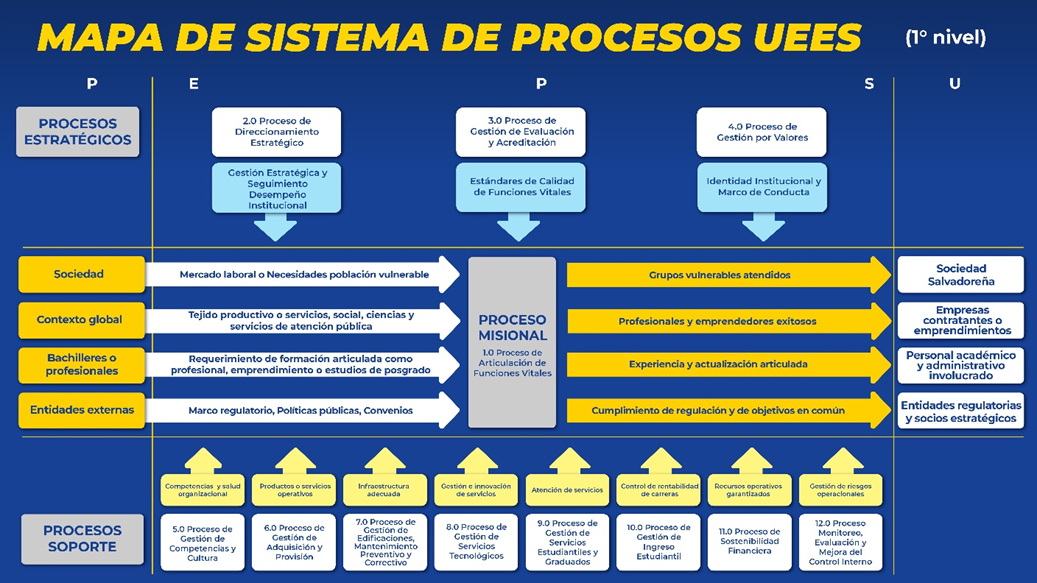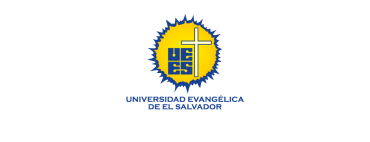Quality Management System
The Universidad Evangélica de El Salvador, considering its foundations and institutional philosophy; is aware of the changing needs of the environment, and manifests the commitment to its university actors, stakeholders, legal and regulatory part, as well as the requirements of the institution itself; acquires the commitment to improve academic and administrative processes, ensuring that all its activities maintain a high level of effectiveness and efficiency based on process management, through the implementation of the Quality Management System based on the principles of quality, which allows monitoring and evaluation towards continuous improvement of its institutional work, based on the PHVA cycle (Plan, Do, Check and Act), which is made up of the following strategic instruments:
QUALITY POLICY
![]()
![]()
The purpose of the Quality Policy is to manifest the commitment of Universidad Evangélica de El Salvador, to implement a world-class management system; focused on the satisfaction of interested parties, including legal and regulatory requirements, and oriented to continuous improvement.
"At Universidad Evangélica de El Salvador we believe in a culture of quality management, for the monitoring of senior management in compliance with the regulatory framework of Higher Education Institutions in El Salvador, promoting the commitment of staff in terms of the articulation of vital functions (Teaching, Research, Social Service, and Scientific Dissemination); as well as, to the strategic and support processes; with the purpose of forming professionals with academic quality and Christian values that guide their lives in all their spheres of influence."
GENERAL DEVELOPMENT PROJECT (GDP)
![]()
![]()
![]()
UEES conceives the GDP as its intention projected into the future, which is made up of:
- Perspectives, which help to organize the strategic objectives and bring them together in terms of those elements on which a goal is set.
- Strategic Axes are the strategies analyzed by senior management to support decision making in the established period.
- Long-term strategic objectives (5 years), in line with its Mission, Vision, and values, according to the National Higher Education Policy.
- Balanced Scorecard (BSC), as a tool that harmonizes long-term strategic objectives with strategic indicators, compliance deadlines, responsibilities and results, for follow-up.
- Short-term operational plans (1 year) that respond to the degree of annual progress in each goal, specifying indicators, responsible parties, deadlines, budget, and ways of measuring compliance year by year in congruence with the Vision of the Future.
The information in the GDP is compiled under a structure of four perspectives:
- Professional Development,
- Articulation and Linkage,
- Quality and
- Financial Sustainability
PROCESS GOVERNANCE
![]()
![]()
Process Governance is evidence of the commitment of UEES senior management to the fulfillment of goals reflected in the General Development Project (GDP) that frames the institutional commitment of UEES in the five-year period 2022 - 2027. This is reflected in a transversal work structure that inductively is described as follows:
Improvement teams: temporary teams made up of specialists from different areas with the sole objective of solving a problem or proposing a project necessary to reverse a problem.
Process teams: made up of personnel representing the various units responsible for meeting the proposed goals.
Institutional Quality Committee: structure approved by the Executive Board, composed of administrative and academic staff as follows: President: Director of Institutional Planning and Development; Secretary: Institutional Quality Coordinator; Members: Director of Educational Quality, Human Resources Manager, Information Technology Manager, Maintenance and General Services Manager. This Committee is responsible for creating the regulatory framework governing academic and administrative quality, promoting process reforms in coordination with the teams, methodological adjustments, indicators, special process evaluations, and proposals to the Executive Board.
PROCESS MANUAL
![]()
![]()
The Process Manual describes the entire structure and mechanisms with which the institution complies with quality, according to the requirements established by its users, stakeholders, and legal and regulatory parts. With the purpose of providing a guide for the realization of each of the strategic, support, and operational processes of UEES, it is constituted as the fundamental documented information of reference in relation to quality management, critical input in internal control audits, and internal or external quality audits. The priority is to automate these processes with a focus on innovation.


LEGAL AND REGULATORY COMPLIANCE
![]()
![]()
![]()
UEES preserves the applicable legal and regulatory compliance, provided in guidelines, laws, and regulations of the Ministry of Education of the Republic of El Salvador regarding its operation for higher education.
Likewise, it considers compliance with all the requirements of the different ministries and national and international organizations to which it is linked with its work.
Therefore, in each process that makes up the Manual, and specifically in the Characterization Sheet, the corresponding compliance is determined, both internal and external requirements.
